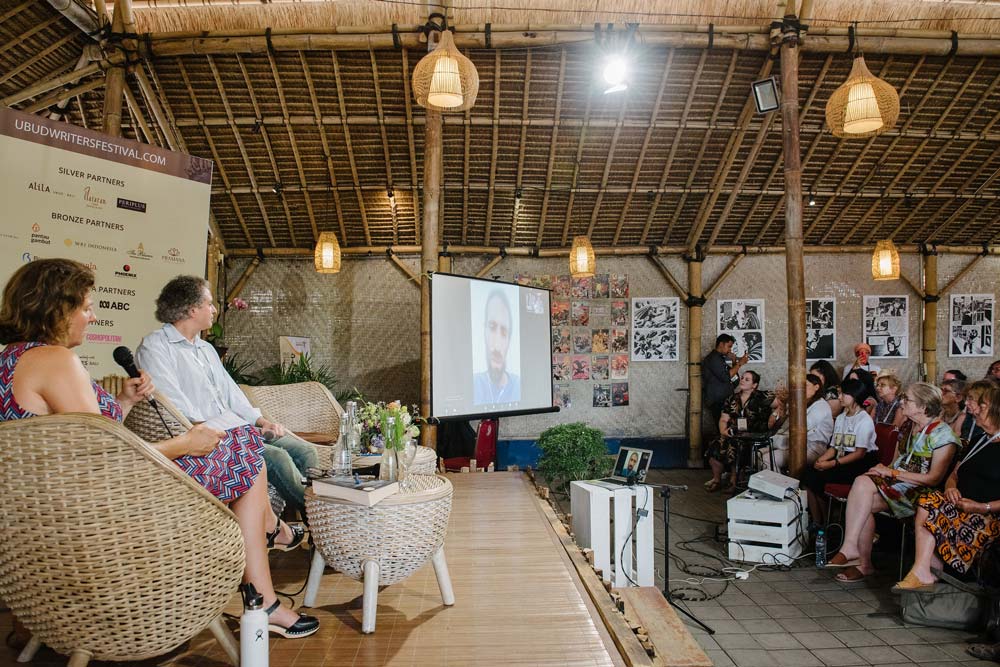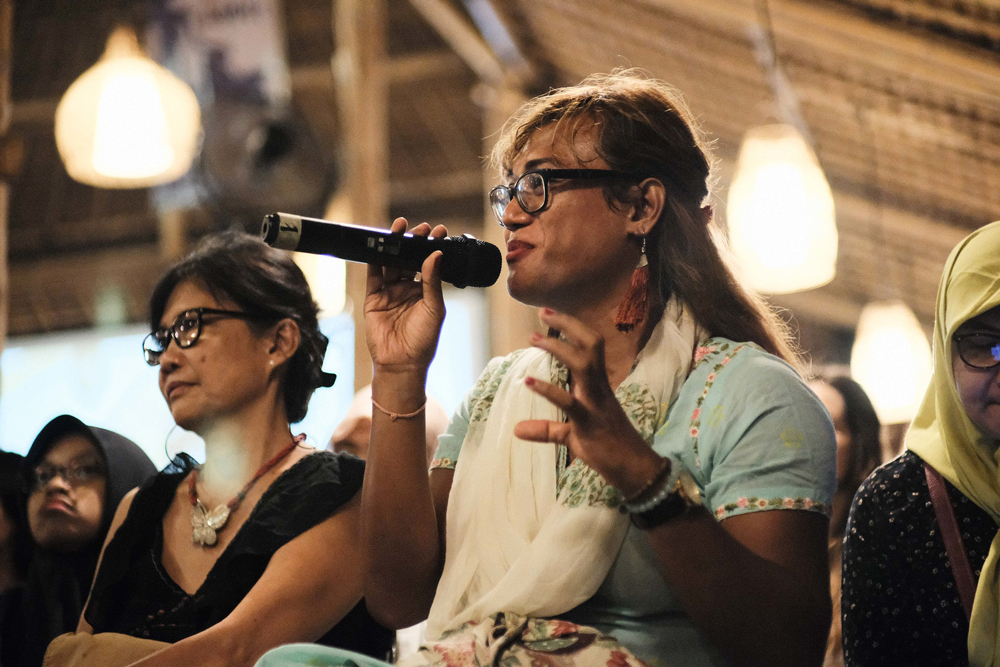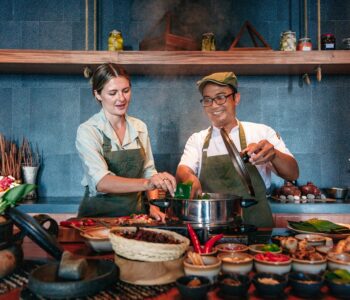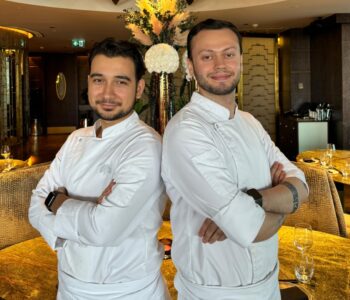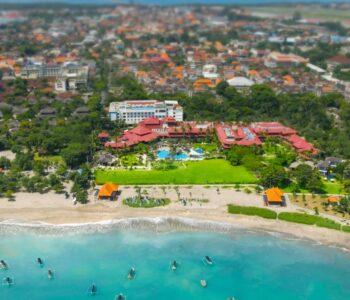Listen to this interview with Janet DeNeefe on the ‘NOW! Indonesia with Alistair Speirs’ Podcast:
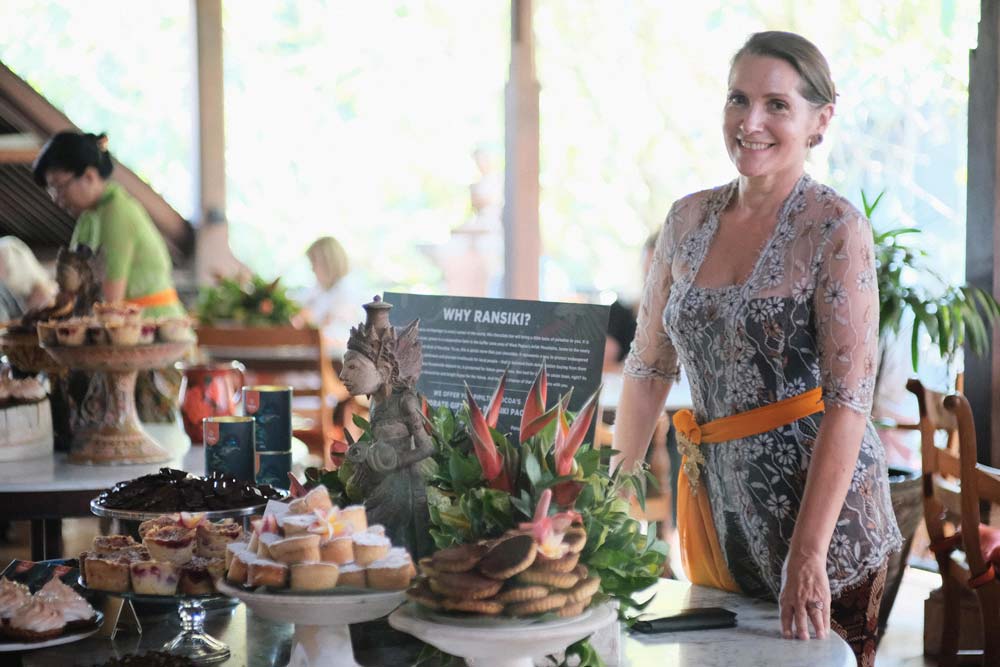
Publisher Alistair interviews the Founder and Director of the Ubud Writers and Readers Festival, Janet DeNeefe : This is a special interview with a lady who deserves a great deal of attention at the moment, somebody who has been a resident of Bali for many years and, and who has made her mark not only on the hospitality industry, through her restaurants, Casa Luna and Indus but also her guest house, the Honeymoon Guest house.
This is a lady who dedicated herself to helping Bali after the Bali bombings and is now continuing to dedicate herself to the future of Bali through her now world renowned Ubud Writers and Readers Festival. She started the festival as a response to the Bali bombings to try and rekindle international interest through a particular, senior, cultural market and while Bali itself doesn’t have a literary reputation, more of a reputation for art, culture, tourism and nature, she managed to grow it from its very small beginnings to something which has gotten great recognition worldwide.
You can listen to or watch this interview via our Podcast or YouTube Channel:
Interview with Janet DeNeefe, Founder and Director of the Ubud Writers and Readers Festival
Alistair G Speirs: Congratulations to Janet De Neefe, the Founder and Director of the Ubud Writers and Readers Festival as you have managed to keep it going for another year. Janet, tell us all about it, how are you still managing to keep going?
Janet DeNeefe: So I just keep going! We started the festival in response to the Bali bombings all those years ago. And the aim was to boost the economy and to boost the faded spirits of the people. And of course, as you say, we started from very small, very humble beginnings, and it has grown and grown as we all know, and become something incredibly exciting and of great economic value to Ubud and Bali and become an extraordinary networking kind of meeting place for all sorts of writers and artists. So it’s, it’s been a wonderful journey. And of course, now with COVID, we’re having to re-imagine the festival and as everybody is doing, create a hybrid program, which of course has its challenges. Last year was the first time we did it, so we were all newbies and struggling with how to keep up and how to be as good as we normally are to a high professional standard. So it’s the same this year having to create this hybrid festival without an audience and this is of course an issue for us. So it brings its challenges, but at the same time, we understand we have a role to fulfill, to help Bali in whatever way we can. And so if it means it’s an online festival and sending the word out across the world, that’s a good thing. And then of course we will also hold events on the ground, but this is just for our domestic audience, but nevertheless, I do hope these will be a very exciting part of the program, and that will, once again, also provide some sort of boost for the local economy.
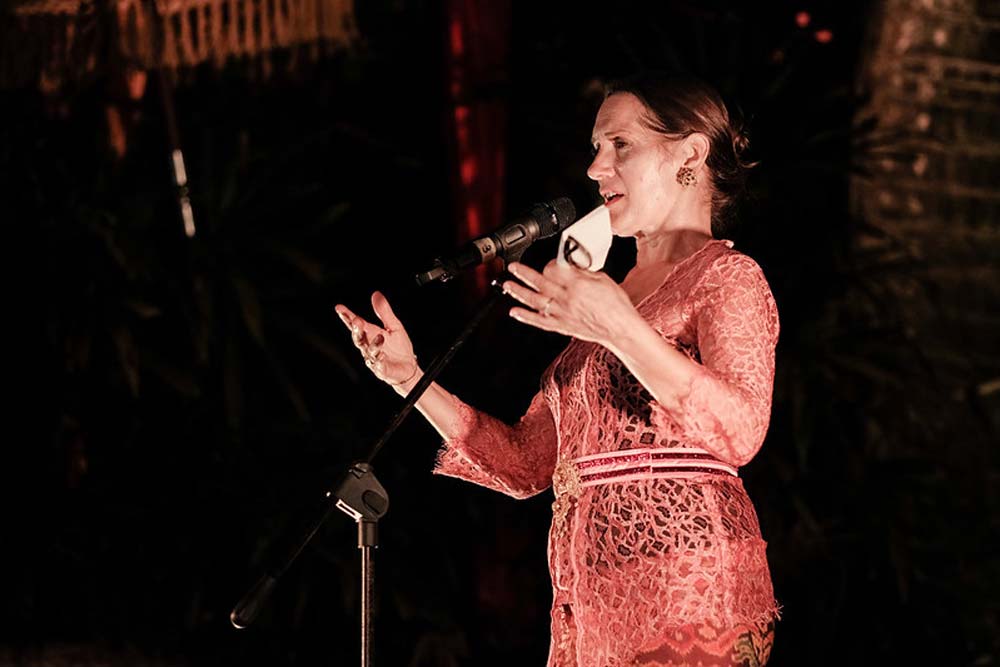
AGS: Yes it’s the influx of foreign visitors that brings the biggest economic boom and the moment we’re really not sure of when Bali is going to reopen, it seems to be going on and on. Hopefully we can reopen to fully vaccinated people – that that could certainly work. But looking back, have you fulfilled the objectives from the first festival? Let’s say we’re on really on phase two now and the first objectives have been really achieved, so what do you want to achieve now?
Janet DeNeefe: In terms of the overall festival? From start to now I guess we’ve achieved the objective of putting it on the global map and also on the global literary scene. Yes. We’ve done that. And to change the emphasis on Bali, which was another part of our aim to, you know, after the bombings to take it away from, the “beer scene” and the bars and the beaches, et cetera, to bring it back to its rich cultural identity. I think we’ve done that. We’ve brought together writers, who’ve been networking and meeting Indonesian writers and publishers and other festival directors because over the years we’ve had so many festival directors come to Bali, scouting for local talent or interesting talent. We’ve done that. We’ve brought people into Ubud, Indonesians, as well as other creatives who have moved over solely because of the festival.
AGS: That is really a lot you have achieved, well done. What else is there to do?
Janet DeNeefe:: The one thing though that I still want to develop more is the writers’ retreats and the residency programs and the workshops that benefit young Indonesian writers. And that’s actually what we’re focusing on more right now, how to further their skills and create the same sort of opportunities that writers from the west receive. So that’s a bit of a priority for us now in this COVID era, how can we actually make our festival create more opportunities for young writers and established writers as well?
AGS: There is a strong worldwide “rejection” of reading of course, Janet, and this thought that everything you need to know is on your phone, which is something else that we’re all fighting against. Has going digital helped to increase appreciation while you’re doing these hybrid festivals? Is that a temporary measure or is that going to be something which you’re going to continue to do now that you’ve discovered how to do the hybrids?
Janet DeNeefe:: I think hybrid is here to stay. It’s been incredibly interesting and the fact that last year for the festival we actually covered our running costs through our hybrid event, even though we were so nervous. We thought we were going to spend our last pennies on this event and lose everything. And I’ve really enjoyed looking at Instagram and IG Live, things like that. My daughter Laksmi, has been running the UWRF book club on IG live and the engagement is really good. And I know that there are new people that have found out about us through that, mainly Indonesians. And I guess that’s just been an overall focus for us during COVID, how to connect with more young Indonesians. And if you want to do that, social media is the key actually.
So we’ve been experimenting and learning about all of that. It’s fun. It’s a whole new world, but we need to be a part of it. And of course with Indonesia, I think more than 50% of the population is under 30. So these are the people that we want to be reaching out to because that’s our future audience and why not? Because that is what I love about Indonesia. It’s this really dynamic, vibrant culture, these young voices, young people doing lots of amazing things. So we want to be a part of that journey.

Photo by Wirasathya Darmaja 
Photo by Anggara Mahendra
AGS: A lot of them are very instant and that wonderful word, Instagram is all about instant gratification rather than reading a 700 page book. So we have to fight a little bit against the the 3o second soundbite. But I appreciate very much that you are including them in your portfolio, your desires for the future. There is of course a slight conflict as well because the festival is mostly in English for the international audience rather than being in Bahasa Indonesia, which is where the literary aspirations of the Indonesians are likely to be. Are you increasing the Bahasa Indonesia content to satisfy this new audience?
Janet DeNeefe:: Absolutely. And even on Instagram, we have a lot of other talk sessions, connecting writers and these are in Indonesia as well. So we have a very strong Indonesian program this year covering really diverse subjects. So for sure, our Indonesian program’s getting much stronger. The Emerging Writers’ Program we started a few years ago is really part of this, including the retreats and residencies and trying to mentor people. I’m very excited about that this year with the emerging writers program, we put it out there for young writers to submit their work and we select I think this year is like 15 of them. And then those 15, we actually translate their work and publish it. But the second intake is of at least 50 writers, they’ll all be enjoying different writing workshops with translators, again with a number of different themes. And so we’re just trying to move forward with offering these sorts of opportunities and we’re doing this all online anyway. So again, this has been really helpful for us. So there’ll be all sorts of zoom sessions.
And we’re also offering a mentorship program for established writers to help mentor younger writers. And this will be a six or seven week program. So we’ve been very lucky that we’ve had support from the Australian Government and also the US Embassy through the Iowa Writers Program. I think people are eager to help as much as they can in whatever way they can. So we’ve been really lucky. And of course you’ve been a great supporter of us all the time. We love our dedicated sponsors.(Editor’s Note: Now!Bali and Now!Jakarta have been sponsors from the beginning of the Festival) You know, otherwise we wouldn’t be here, I think people don’t realize that we couldn’t survive otherwise.
AGS: Janet, please give us the dates for this year’s program, and give us some exciting names that we’re going to see and hear there so that we actually get people excited now.
Janet DeNeefe:: Well the dates are 8 until 17 October and some of the bigger names…. we have Julia Baird from Australia who is fantastic. Her book is gobsmacking. We have Viet Thanh Nyuyen, Vietnamese/American author, really impressive guy. We have ADA Limon, who’s a fantastic poet from the states. Amitav Ghosh, Ruth Ozeki, Desi Anwar, Andre Aciman, Wade Davis, Felix Nesi . We have the bigger names who are fantastic, but then we have all the little threads, and I think that’s what one of the audience members one year said to me, she said, “what I really love about your festival is I come here knowing that maybe three quarters of the program with the writers list, I’ll have no idea who they are, but leave with this whole new world of authors that are fascinating, that I didn’t know about”. So this year we’ve really delved into the theme Self-Reflection and looked at it in terms of our own selves, our environment, we’ve gone into the forest, we’re talking about forest bathing, where we’re talking about deserted building sites in arid environments. Yeah. Talking about ghosts just talking about the incredible things that somehow this year with COVID makes it extremely relevant. So I’m very excited about our really diverse program.
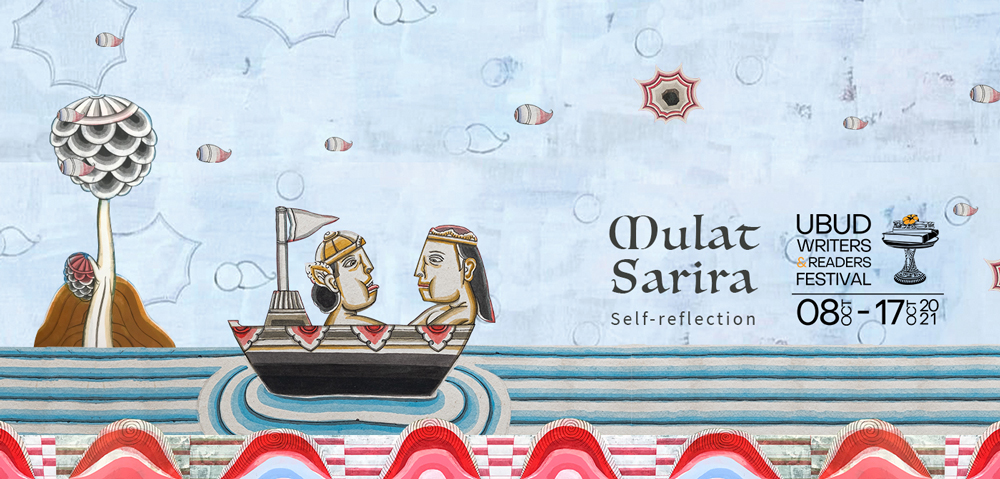
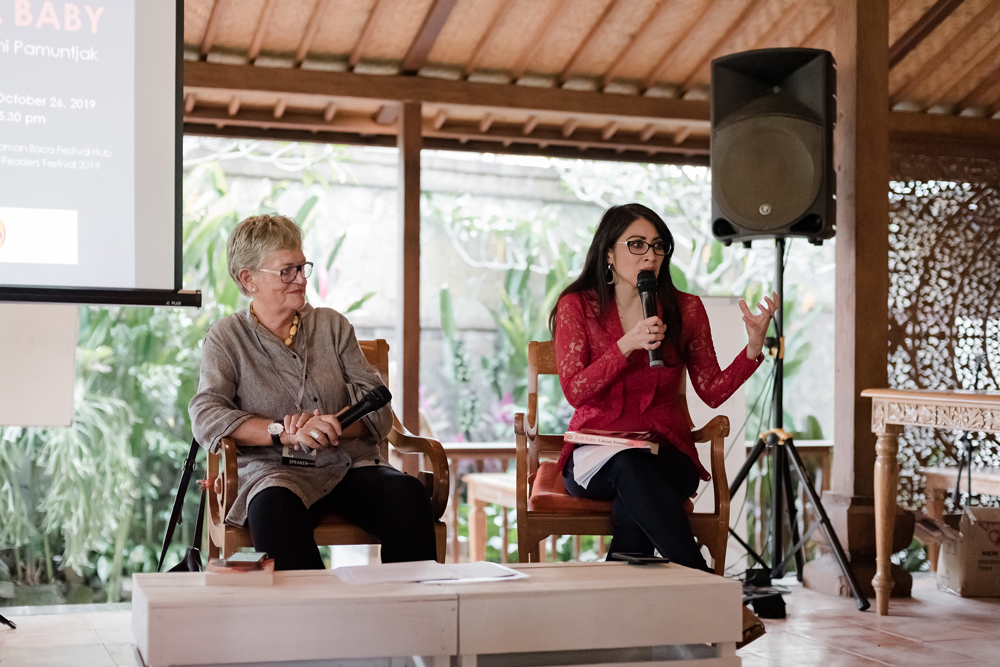
AGS: Reflection is certainly something we’ve all been doing during these moments: looking at who we are, where we are, why we are. So that’s very good – 8th to 17th of October. Now, if somebody actually wants to come to Ubud, and is able to come, will you be able to welcome them to the all the onsite events?
Janet DeNeefe:: Absolutely. So we will hold on-site events over both weekends and we’ll be holding films in the valley down below, like we’ll have a big screen in the valley. So with COVID protocol observed, we’ll be having some smaller sessions. We are looking at local writers and local architects like Popo Danes, people like that. People on the island that are absolute heroes and changemakers. So yeah, we hope to have a really interesting program for those of us who are in Bali.
AGS: Will Taman Baca be open as it was? So you still have that center that people can go to and walk around and become part of the scene, which is really a great place to be, to meet.
Janet DeNeefe:: Yes, and we’ll overlap that by the way with our Ubud Artisan Market. So that will be running at the same time. So there’ll be that sense of street food and interesting crafts and things like that. So, we can still keep doing that sort of thing right now. I mean, markets are still open and so that will be great.
AGS: To close our conversation, can you tell us one of your favorite moments from the last, how many years has it been since it started – 17?
Janet DeNeefe:: I’ve had so many favorite moments, I suppose, one that will always stick in my head though, is that the second festival in 2005 was held, I think a week after the second Bali bombings. And so that’s a year I will never forget because it was six days before the festival. So there was this absolute panic, like what’s going to happen now? But luckily most of the writers did attend and I was worried that the big names would drop out, but by chance Amitav Gosh was already staying at our place. And Michael Ondaatje was about to land the next day. So luckily we went ahead and, you know, the absolute camaraderie and just the, the beautiful feeling that went through all the writers and the community, just this sense of support and togetherness a bit like now, I guess it’s a festival I’ll never forget because of just the immense emotions and the sadness, but then the happiness. That’s one that will go down in history.
AGS: on behalf of Now!Bali and Now!Jakarta, we would all thank you for being part of the very visible part of the rescue of Bali after the Bali bombings and your continued efforts to champion the right way of looking at Bali. And we hope that that the island will start recover soon because there are so many people, depending on tourism for their income. And we know that there are lots of people who are suffering right now. So, if you’re a Jakarta resident, why not book now, get over there and enjoy every minute of it. Ubud is a great place to go to any way. And if you’ve got something wonderful, something meaningful like this to go to, you’ve got Janet de Neefe to thank, and her team who have done a great job over the years. And we hope that we’ll see you on the 8th of October. Thank you Janet and good luck.
Find out more about this year’s festival, taking place 8 October – 17 October 2021, at ubudwritersfestival.com.

